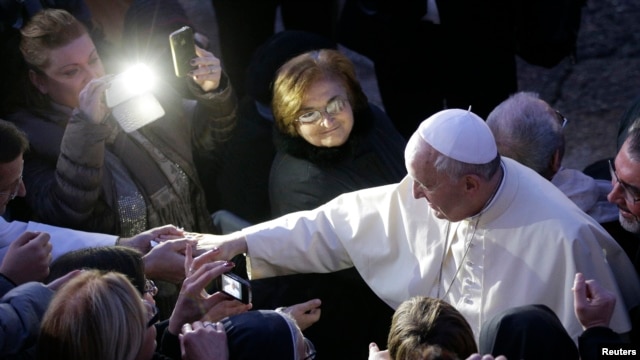News / Science & Technology
FILE
- Pope Francis greets the faithful as he arrives to visit the Church of
St Alfonso Maria dei Liguori in the outskirts of Rome, Jan. 6, 2014.
January 23, 2014
Pope Francis today declared the Internet “a gift from God,” in a statement released by the Vatican to mark the Catholic Church’s World Communications Day.
The pope said the Internet “offers immense possibilities for encounter and solidarity” and that “is something truly good.”
Citing increased levels of inequality around the world, the pontiff said the media could play a role by “creating a sense of the unity of the human family which can in turn inspire solidarity and serious efforts to ensure a more dignified life for all.”
There are downsides to greater interconnectedness, the pope said, adding that the speed of communication “exceeds our capacity for reflection and judgement.”
He added that by offering a wide variety of ideas, electronic forms of communication
“also enables people to barricade themselves behind sources of information which only confirm their own wishes and ideas, or political and economic interests.”
Digital connectivity, the pontiff added, “can have the effect of isolating us from our neighbors, from those closest to us.”
And while there are drawbacks, the pope said “they do not justify rejecting social media; rather, they remind us that communication is ultimately a human rather than technological achievement.”
He added that we need to “to recover a certain sense of deliberateness and calm” and that “this calls for time and the ability to be silent and to listen.”
The 77-year-old Argentine has proved a somewhat controversial figure, saying, for example, that homosexuals should not be marginalized and that Catholics should reach out to atheists.
In today’s statement, he told his followers that “engaging in dialogue does not mean renouncing our own ideas and tradition.”
Francis said the Internet and social media offered a chance for such a dialogue.
“The digital world can be an environment rich in humanity; a network not of wires but of people,” he said.
The pope said the Internet “offers immense possibilities for encounter and solidarity” and that “is something truly good.”
Citing increased levels of inequality around the world, the pontiff said the media could play a role by “creating a sense of the unity of the human family which can in turn inspire solidarity and serious efforts to ensure a more dignified life for all.”
There are downsides to greater interconnectedness, the pope said, adding that the speed of communication “exceeds our capacity for reflection and judgement.”
He added that by offering a wide variety of ideas, electronic forms of communication
“also enables people to barricade themselves behind sources of information which only confirm their own wishes and ideas, or political and economic interests.”
Digital connectivity, the pontiff added, “can have the effect of isolating us from our neighbors, from those closest to us.”
And while there are drawbacks, the pope said “they do not justify rejecting social media; rather, they remind us that communication is ultimately a human rather than technological achievement.”
He added that we need to “to recover a certain sense of deliberateness and calm” and that “this calls for time and the ability to be silent and to listen.”
The 77-year-old Argentine has proved a somewhat controversial figure, saying, for example, that homosexuals should not be marginalized and that Catholics should reach out to atheists.
In today’s statement, he told his followers that “engaging in dialogue does not mean renouncing our own ideas and tradition.”
Francis said the Internet and social media offered a chance for such a dialogue.
“The digital world can be an environment rich in humanity; a network not of wires but of people,” he said.





No comments:
Post a Comment